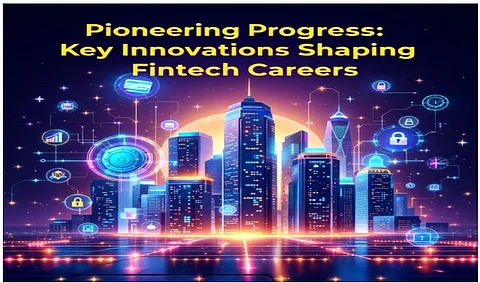

In a world where digital transformation is transforming entire industries, FinTech has turned out to be one of the most disruptive and rapidly expanding domains. New estimates indicate the global FinTech market may hit $300 billion by 2025, demonstrating burgeoning consumer appetite for quicker, more convenient financial services. That's why experts in the industry like Utham Kumar Anugula Sethupathy—whose rich experience encompasses global financial operations, regulatory compliance, and the implementation of technology—are contributing to how lucrative careers in this field are formulated.
In a time when digital transformation is redefining whole sectors, FinTech is a force to be reckoned with, fueled by technological disruption and API-connected ecosystems. One of the leading influencers in this area is Utham Kumar Anugula Sethupathy, who provides insightful views on the practical measures and innovation milestones behind career achievements in FinTech. From his rich experience in international financial operations, he bridges the swift pace of technical development seamlessly with practical career growth strategies.
One of the most transformative innovations in FinTech is the wide adoption of Application Programming Interfaces (APIs). These frameworks have enabled seamless platform integration, improved data exchange, and enhanced customer experiences. Secure protocols like OAuth 2.0 support interoperability, reducing integration hurdles. As a result, financial services benefit from greater efficiency, lower costs, and increased innovation in product development.
Real-time processing of data is an important cornerstone of FinTech's development, particularly within high-transaction volume environments where speed and precision are paramount. Fraud detection and regulatory requirements are life-critical and require immediate information to minimize risks and gain customer confidence. Advanced analytical platforms are now able to detect anomalies within seconds, limiting fraud and reducing response times. For example, a major digital payments platform recently applied AI-powered analytics to identify suspicious transactions in real-time, reducing fraud by more than 30% in one quarter. As digital finance grows, professionals who possess skills in developing, operating, and refining such real-time structures have a determinative edge.
In the competitive FinTech job market, a strong, results-driven portfolio can have more credibility than a traditional CV. Demonstrating hands-on experience—be it in the form of technical diagrams, compliance-based initiatives, or creative problem-solving—allows one to differentiate oneself. Not only does such a portfolio demonstrate technical proficiency, but it also displays an intuitive comprehension of regulatory regimes and commercial implications. As recruitment trends shift towards result-oriented assessment (e.g., improving efficiency, lowering compliance risks, or strengthening system performance), those who can prove measurable effect drive their professional de
FinTech’s influence now extends beyond banking into sectors like healthcare, retail, and logistics. Demonstrating adaptability and regulatory awareness across multiple markets can make a project portfolio especially attractive to employers and stakeholders. This cross-industry perspective prepares professionals for complex real-world challenges, where sector-specific regulations and unique user behaviors converge. In an interconnected economy, being able to pivot across different verticals often becomes a clear differentiator.
FinTech's reach today goes beyond finance into healthcare, retail, and logistics. Showing versatility and regulatory sensibility in several markets can render a project portfolio particularly desirable to employers and stakeholders. Having a cross-industry view equips professionals for multifaceted real-world challenges, where regulations across individual industries and special user behaviors intersect. In a globalized economy, being able to switch between different verticals often proves to be a definite differentiator. Learning Never Stops: Stay Ahead or Fall Behind.
With FinTech's fast pace, keeping abreast of industry news is essential. Keeping current through regular reading of trade journals, online learning websites, and technology blogs prepares professionals to innovate and adjust with confidence. Attending webinars, conferences, and industry events can also broaden both knowledge and connections. Being one of the pioneers to grasp and implement new technologies often means leadership roles and sets the stage for ongoing professional development.
As technical skills are a given, soft skills are now increasingly recognized as being the key to FinTech. Effective communication is the bridge over difficult systems and across various stakeholders—regulators, clients, and teams—to bring about mutual understanding. Clarity in documentation and effective presentation create trust, while robust digital collaboration facilitates secure remote access to universal financial services.
Decentralized finance (DeFi), embedded-finance solutions, and regulatory technology (RegTech) are being gradually shaped into the next generation of traditional finance. DeFi uses blockchain and smart contracts to eliminate the intermediaries, demanding experts well-versed in distributed systems and cybersecurity. Embedded finance integrates financial services into non-financial apps, demanding those that can integrate payments logic with fantastic UX. On the other hand, RegTech is on the rise, rewarding the trailblazers of creativity who impose strict compliance.
Going with Utham Kumar Anugula Sethupathy over his perception of the ever-changing FinTech domain, he highlights mastering fundamental technologies, building a strong portfolio, good communication, and lifelong learning. What emerging FinTech innovation will you choose to incorporate into your career blueprint for the year? Staying ahead of the curve and being flexible will indeed keep you relevant in the digital world, where finance keeps getting bigger through decentralization, embedded finance, and regulations. In the end, those who possess a strong technical basis and are open to change will lead the next-generation financial services.
